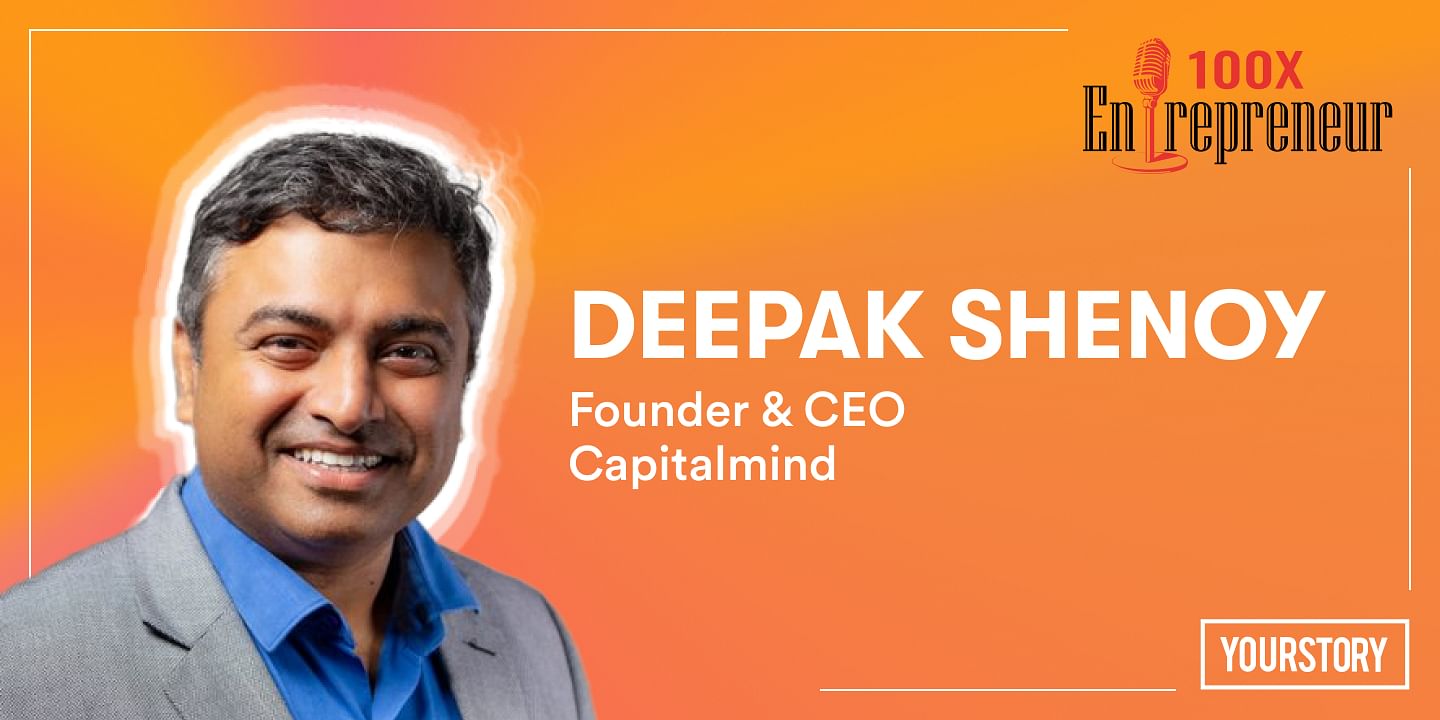Think of investing in India’s capital and cryptocurrency markets and unicorn startups like Groww, CoinCDX, and Zerodha come to mind.
However, investing from a mobile phone was almost unthinkable when tech engineer-turned-investor and entrepreneur Deepak Shenoy took an interest in Dalal Street and invested his first rupee in 1999.
“We didn’t have Demat accounts; there were physical certificates at the time. I had a little bit of money and put all of it into a mutual fund in February 2000 – at the peak of the dotcom boom – to see how the whole thing worked. And, of course, the world came crashing down. My investment in a technology fund fell 80 percent,” said Deepak, recalling his initial days of investing that entailed lots of learning from doing direct investing, buying mutual funds, and looking at quantitative algorithmic investing, among others.
He has since built a fintech company based on algorithmic trading, worked for an algorithmic hedge fund, and founded SEBI-registered wealth management firm Capitalmind, which claims to be focused on detail-oriented, long-term investing methodology.
In a conversation with Siddhartha Ahluwalia, Founder and Host of 100X Entrepreneur, Deepak said investors should be forward-looking and not be focused on a company’s current earning potential alone. One must look at potentially how big the market can grow and how much of that space the company can grab.
He emphasised that betting on a company’s future was not a one-time process but “something that you do over a long period of time”.
Deepak, who has seen two market crashes (the 90s dotcom boom and the 2008 housing crisis), shared his expertise on building wealth by investing in his recently-released book, Money Wise: Timeless Lessons on Building Wealth.
But when asked if people taking less extreme stress were happier, Deepak offered food for thought. “Typically, all progress is a result of unhappiness. So people who take extreme risks tend to make the most progress in society. That’s because they are inherently unhappy about the status quo. So you know, happiness and progress are sometimes not compatible.”
(Representational image)
Finding contentment in the investment market
In the hullabaloo of the financial market, Deepak maintains that contentment can be achieved by staying on track in one’s investment plans. “It is saying I am at the right kind of distance from my goals; the closer you are to it, the more on track you are.”
“For instance, if I were to go from Bengaluru to Mysuru, which is 140 km and would take roughly two hours. If in one and a half hours, I have only done 30 km, I’m in trouble because I’m not going to get there in another half an hour no matter what the traffic situation,” he shared, drawing the analogy to state that people then take extreme risks in investment when they learn they are way behind.
“That is when concerns over extreme risks and losses loom large – and losses are more likely than gains. To meet their financial or wealth creation goals, people tend to course-correct by giving up early retirement or working a second job.
“So people who need less course correction are usually the happiest,” he said.
Drawing from his decades of observation, he said people who are not willing to give up their jobs along with investing can achieve a wealth of Rs 10 crore at a later stage in their lives.
However, he quipped that the purpose of money is to solve one’s emotional problems and provide emotional satisfaction, whether that comes from buying a house, a car, or anything.
Deepak said these purchases should not be thought of as hindrances to wealth creation because wealth creation is about enhancing the journey, and not the destination. “Wealth creation is the byproduct.”
Investment: an underserved market
In India, fintech startups have enabled capital market investments for a large group of the population having smartphone and internet connectivity. Does that mean that investing has become a mainstream activity for the general public?
Deepak does not think so.
“It’s because they (startups like Groww, Upstox, and Zerodha) have been able to raise capital on the back of the fact that India is relatively underserved in terms of the number of businesses that have brought people into investing. The scale and the landscape has changed quite dramatically in the last one year and people are hoping more great things will happen with the pumping of money. And more people will continue to invest,” Deepak said.
To know more, listen to the entire podcast here.
01:40 – Beginning of his investing journey
04:33 – Where would your 1st crore of wealth come from?
07:17 – Behavioural changes in growing from 1 to 10 crore wealth
10:29 – True definition of financial independence
14:20 – Are emotional buying decisions hindrances in wealth creation?
24:13 – Has investing become mainstream in 2021?
33:30 – How to find undervalued investment opportunities?
41:43 – His upcoming book “MONEY WISE: Timeless Lessons on Building Wealth”





![Read more about the article [The Turning Point] Why this banker decided to launch test prep startup ixamBee](https://blog.digitalsevaa.com/wp-content/uploads/2021/04/Mr-1618570682452-300x150.jpg)



![Read more about the article [Funding alert] Biotech startup Immuneel Therapeutics raises $15M in Series A round](https://blog.digitalsevaa.com/wp-content/uploads/2022/06/gene-editing-1640798908761-300x150.png)
